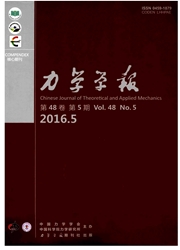

 中文摘要:
中文摘要:
在可压缩多介质流体动力学高精度欧拉计算方法多介质流体分段抛物方法(multi-fluid piecewise parabolic method,MFPPM)基础上,运用算子分裂技术,增加二阶空间中心差方法和两步Rung-Kutta时间推进方法计算动力学黏性以及热流部分对流场的影响,发展适用于NS(Navier-Stokes)方程的可压缩多介质黏性流体计算方法多介质黏性流体分段抛物方法(multi-viscousity-fluid piecewise parabolic method,MVPPM).文中采用MVPPM对英国AWE(atomic weapons establishment)激波管实验进行二维计算,给出了与实验图像基本一致的计算结果;应用MFPPM和MVPPM分别对二维柱对称内爆动力学界面不稳定性及其后期混合过程进行数值模拟,给出内外界面演化、速度历史以及后期中心气穴不同半径内因RT(Rayleigh-Taylor)界面不稳定性引起的混合量分布情况,从计算结果比较可见黏性对物质界面处混合量的分布影响明显.
 英文摘要:
英文摘要:
The compressible multi-viscousity-fluid piecewise parabolic method (MVPPM) is developed for Navier-Stokes equations based on the Eulerian multi-fluid piecewise parabolic method (MFPPM), the second order space central difference method and two-stage Rung-Kutta time marching method. Simultaneously, a common mathematical approach, operator splitting technique was applied to obtain the molecule dynamics viscosity and heat flux effects on flow field. With the application of MVPPM, a numerical case of a two- dimensional shock wave tube experiment from Atomic Weapons Establishment (AWE) is investigated to show a good agreement with the experimental results. Moreover, the interface instability and subsequent mixing model of implasion dynamics are simulated with MFPPM and MVPPM in the two-dimensional cylindrical symmetry case. The evolvement of the inner and outer interfaces, velocity history and the distribution of subsequent mixing in the central cavitations induced by Rayleigh-Taylor (RT) interface instability are obtained. The effect of dynamics viscosity on the mixing distribution in the interface was clearly observed in the numerical results.
 同期刊论文项目
同期刊论文项目
 同项目期刊论文
同项目期刊论文
 期刊信息
期刊信息
